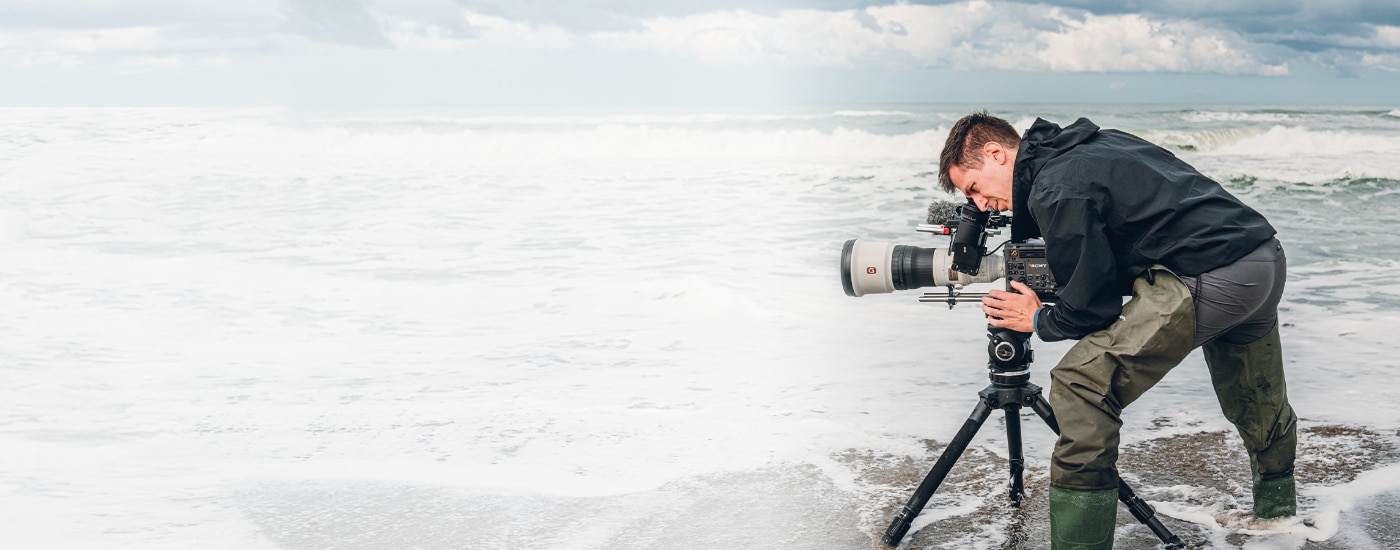Paolo Sodi shoots Soul of Light with BURANO
Behind-the-scenes with Italian cinematographer and Sony Ambassador.

Introduction
When Italian cinematographer and Sony Ambassador Paolo Sodi was asked if he would like to test Sony’s new BURANO camera, he chose to shoot a range of different animals in very different settings. He particularly wanted to discover how the camera would respond to light. From this came the concept of his film Soul of Light, an exploration of wildlife and light.
The film follows four different types of animals in three countries. Turtles and wild horses in Italy, flamingos in France and deer in the UK. Paolo found BURANO particularly well suited to documentary style shooting as it was light and comfortable to use. “You can use it handheld or by shoulder,” he says, “all without a rig.”
Shooting at sunset
When he was filming the flamingos in flight, he operated the camera handheld, taking advantage of the camera’s built -in IBIS image stabilization to easily get steady shots. The LCD screen and high-quality magnifier loupe make it easy to check composition and focus in all types of light.
While BURANO can take PL Mount lenses, for his film Paolo chose to take advantage of the camera’s locking E-Mount and E-Mount lenses. He used the Sony 600 mm f4 and 400 mm f2.8 G-Master lenses with an additional 2x extender to shoot the distant animals.
When filming the deer in London’s Richmond Park, there was often a lot of tall grass passing through the foreground of shots, but despite this the autofocus worked well. Even at 1200 mm, the camera remained focused on the deer. The AF’s responsiveness and transition speed, as well as the size and position of the focus zones, can all be adjusted to suit a wide range of shooting scenarios.
“I was able to work with the ND filter, with the autofocus, shooting at 4K, in slow-mo at 3200 ISO,” Paolo says, “and it all worked very, very well.”
In Italy, while filming turtles at sunset, Paolo chose to take advantage of the camera’s Dual ISO function to shoot at its upper base ISO of 3200 and deliberately stress test the built-in Variable ND filter system. He wanted to understand how the camera would deal with the extreme hard light of the setting sun while shooting at 4K at 120fps.
When I touch the LCD screen to enable the touch tracking auto focus, it works fantastically.
Fast to use
“When I switched on the camera, it started fast, faster than VENICE, faster than the FX6, immediately it was on,” Paolo says. “And when I switch between 8K, 6K or 4K for slow-mo, it’s very fast.”
For a wildlife film maker, this is very important as it helps ensure you never miss a shot. To power the camera, Paolo used V-Mount batteries mounted directly on the back of the camera, two batteries being sufficient for a day or more of filming.
Pushed to the limit
BURANO has 2 base ISOs, 800 ISO and 3200 ISO. This allows you to choose the optimum sensitivity for the scene you are shooting with barely any change in image quality. The upper base ISO allowed Paolo to capture an amazing level of detail with nothing other than moonlight lighting some of his shots.
“A lot of the time I worked with the animals silhouetted in front of the camera,” Paolo says. “I remember shooting with moonlight at 3200 ISO and I can still see the textures of the silhouetted bird.”
Whatever the lighting conditions, Paolo felt that BURANO performed exceptionally well. It captured colors and textures in even the deepest shadows or brightest highlights, in particular, capturing the subtle pinks of the flamingos in a very beautiful way. Compared to other cameras that he’s used, he found the color to have greater richness and depth.
Paolo shot his film using the 16-bit X-OCN-LT codec. He feels that the combination of X-OCN and Sony’s VPG400 CFExpress cards is ideal for this camera, giving post production all the flexibility of a 16-bit raw file while using readily available high-speed media. The files contain a vast amount of information, while remaining surprisingly compact. He used a mix of different scan modes and frame rates from 8.6K at 24fps to 4K at 120fps.
The image quality is fantastic, just fantastic.





